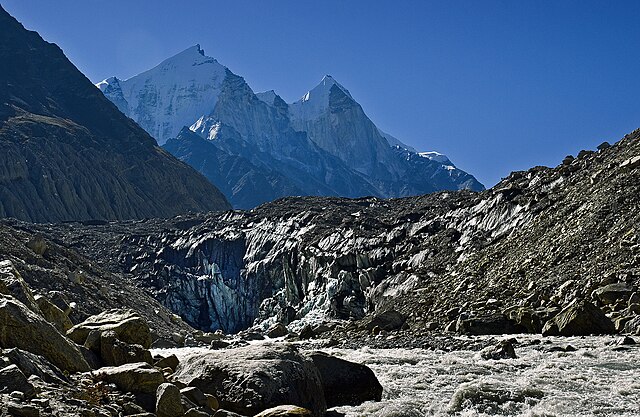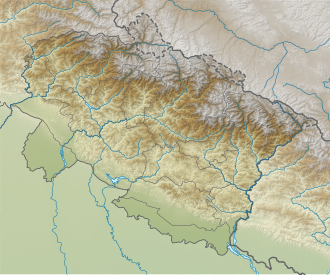Top Qs
Timeline
Chat
Perspective
Gomukh
Source of the Bhagirathi River From Wikipedia, the free encyclopedia
Remove ads
Gomukh, also known as "Gaumukh" or "Gomukhi" (Hindi: गौमुख or गौमुखी ; Assamese and Bengali: গোমুখ or গোমুখী), is the terminus or snout of the Gangotri Glacier and the source of the Bhagirathi River, one of the primary headstreams of the Ganga River. The word Gomukh/Gaumukh (go/gau=cow, mukh= mouth) literally means "Mouth of a Cow."
This article has multiple issues. Please help improve it or discuss these issues on the talk page. (Learn how and when to remove these messages)
|
Remove ads
The place is situated at a height of 13,200 ft (4,023 m) in the Uttarkashi district in the state of Uttarakhand, India. It is one of the largest glaciers in the Himalayas with an estimated volume of over 27 cubic kilometers.
It is a Hindu holy pilgrimage site, visited by many who visit Gangotri. It is around 20 km away from Gangotri and can be reached by trekking.[1][2]
Remove ads
First Visit to Gomukh

Gomukh is mentioned in the Puranas. It is said there that, searching a lost sheep, a boy reached near a glacier in Gangotri, the snout of which exactly looked like the face of a cow, and thus it got its name 'Gomukh'.
The first recorded visit to the Gomukh Glacier was made by John Hodgson and James Herbert on May 31, 1817.[3] However, it is believed that visits to Gomukh occurred long before the 19th century, as it lies on the ancient route of the Chota Char Dham Yatra, connecting Gangotri to Kedarnath. This pilgrimage route was used by travelers and devotees for centuries. In 1935, J B Auden made the first documented crossing of this challenging route, and in his honor, the route was subsequently named Auden’s Col.
Remove ads
Geography

Gomukh is 18 km from Gangotri in the foothills of Bhagirathi at a height of 4,023 m. It is the snout of the Gangotri Glacier.
Around the snout, nature presents a wild topography. There are boulders scattered here and there with some pieces of broken snow, along with the hard clayey snow of the glacier.[4]
The Gomukh snout is rapidly moving backwards. According to the modern research the snout has moved 1 km in just 70 years.
Remove ads
Trek route
Summarize
Perspective
The first and foremost thing for Gomukh trek is that you must have permission from (D.F.O.) District forest officer, Uttarkashi. Only 150 permits are issued per day, permission can be taken via fax also.[5] The trail to Gomukh begins from Gangotri, about 18 km (11.2 mi) from Gomukh. It was heavily damaged by rockslides by the 2013 North Indian Floods as was road access to Gangotri.
9 km ahead of Gangotri is Chirbasa, the abode of Chir trees. After 3 km of Chirbasa comes the dangerous Gila Pahar, the place well known for its landslides even prior to the 2013 destruction of much of the trail here; near-sheer cliffs down to the river must now be traversed. Here the Bharals, a type of mountain antelope, are sometimes seen. The Bharals are found above the altitude of 10,000 ft. Only 4 km from here is Bhujbasa, the only night halting place on the way with buildings. One can stay at the GMVN Bungalow, or at the Lalbaba's Ashram or at Ram Baba's ashram.[6] After trekking 41/2km from Bhujbasa, one reaches Gomukh, the snout of the Gangotri Glacier.A little before Gomukh, the majestic view of Mt. Shivling welcomes the trekkers to the place.
On the trail no horses are allowed, so one must take preparations to walk on foot. The trek to Tapovan and Nandanvan starts from here.

The route after 'Bhojbasa' can be quite difficult, more so since the 2013 floods. One has to cross a boulder zone to reach the Gomukh snout.
The trek beyond Gomukh is quite difficult. Crossing the glacier and going towards Tapovan has become quite dangerous nowadays because of the landslides. There is no track and one must have a guide and should be prepared to face any type of accident which can even be a life-threatening one. The last climb to reach Tapovan is very stiff, within 2 km a climb of around 1500 foot and is quite a challenging experience.
You may apply for an online permit,[7] even with an online permit you would still need to get it verified at the district magistrate uttrakasi office.
Remove ads
References
Wikiwand - on
Seamless Wikipedia browsing. On steroids.
Remove ads




